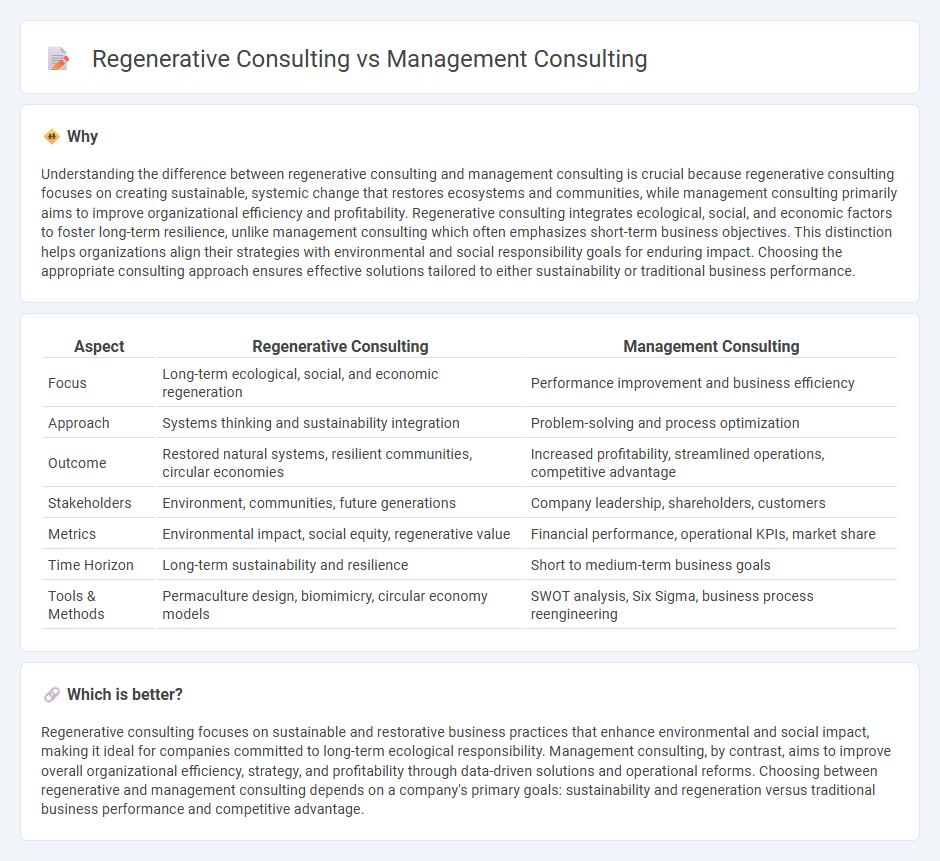
Regenerative consulting focuses on creating sustainable systems that restore and enhance environmental, social, and economic well-being, contrasting with traditional management consulting which centers on optimizing business performance and operational efficiency. Its methodologies integrate ecological principles and circular economy strategies to drive long-term resilience and innovation. Explore how regenerative consulting can transform organizational impact for a sustainable future.
Why it is important
Understanding the difference between regenerative consulting and management consulting is crucial because regenerative consulting focuses on creating sustainable, systemic change that restores ecosystems and communities, while management consulting primarily aims to improve organizational efficiency and profitability. Regenerative consulting integrates ecological, social, and economic factors to foster long-term resilience, unlike management consulting which often emphasizes short-term business objectives. This distinction helps organizations align their strategies with environmental and social responsibility goals for enduring impact. Choosing the appropriate consulting approach ensures effective solutions tailored to either sustainability or traditional business performance.
Comparison Table
| Aspect | Regenerative Consulting | Management Consulting |
|---|---|---|
| Focus | Long-term ecological, social, and economic regeneration | Performance improvement and business efficiency |
| Approach | Systems thinking and sustainability integration | Problem-solving and process optimization |
| Outcome | Restored natural systems, resilient communities, circular economies | Increased profitability, streamlined operations, competitive advantage |
| Stakeholders | Environment, communities, future generations | Company leadership, shareholders, customers |
| Metrics | Environmental impact, social equity, regenerative value | Financial performance, operational KPIs, market share |
| Time Horizon | Long-term sustainability and resilience | Short to medium-term business goals |
| Tools & Methods | Permaculture design, biomimicry, circular economy models | SWOT analysis, Six Sigma, business process reengineering |
Which is better?
Regenerative consulting focuses on sustainable and restorative business practices that enhance environmental and social impact, making it ideal for companies committed to long-term ecological responsibility. Management consulting, by contrast, aims to improve overall organizational efficiency, strategy, and profitability through data-driven solutions and operational reforms. Choosing between regenerative and management consulting depends on a company's primary goals: sustainability and regeneration versus traditional business performance and competitive advantage.
Connection
Regenerative consulting integrates principles of sustainability and systems thinking to promote long-term organizational health, aligning closely with management consulting's focus on optimizing business processes and strategic planning. Both approaches emphasize adaptive leadership, stakeholder engagement, and innovation to drive resilient growth and value creation. By combining regenerative methods with traditional management consulting frameworks, organizations can achieve holistic transformation that balances economic, environmental, and social outcomes.
Key Terms
Strategic Planning
Management consulting in strategic planning emphasizes data-driven decision-making, operational efficiency, and competitive analysis to optimize business performance. Regenerative consulting integrates sustainability principles and systemic resilience, aiming to create long-term value for communities, ecosystems, and stakeholders. Explore how these consulting approaches reshape strategic planning for future-ready organizations.
Systems Thinking
Management consulting traditionally focuses on optimizing organizational structures, processes, and strategies to enhance performance and profitability, often using analytical tools grounded in Systems Thinking. Regenerative consulting goes beyond this by applying Systems Thinking to restore and enhance complex systems, emphasizing sustainability, resilience, and long-term ecological and social health. Explore how integrating regenerative principles within consulting practices can transform business impact and stakeholder value.
Regeneration Principles
Management consulting primarily emphasizes optimizing organizational efficiency, strategic planning, and problem-solving through data-driven frameworks. Regenerative consulting centers on applying Regeneration Principles, such as systems thinking, ecological balance, and social equity, to foster sustainable and restorative business practices that benefit people and the planet. Explore the transformative potential of regenerative consulting to align your business with future-focused sustainability goals.
Source and External Links
Management Consulting - Management consulting involves providing advisory services to organizations to enhance their performance and achieve objectives by leveraging specialized expertise and best practices.
What Is Management Consulting? - This article defines management consulting as a broad advisory service that encompasses strategy, operations, and HR consulting to improve business strategies and processes.
What Is Management Consulting? - Management consulting is a field where professionals provide solutions and strategies to improve the financial and operational health of organizations by analyzing complex problems.
 dowidth.com
dowidth.com